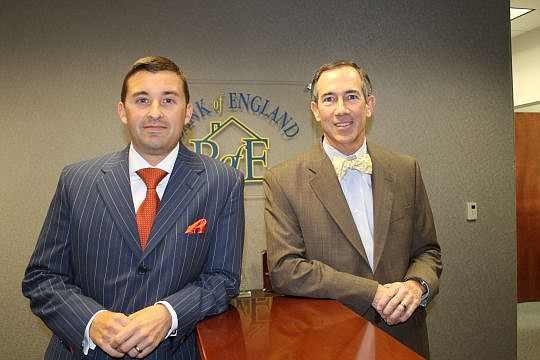
One year into the housing recession might seem like the worst time to open an independent mortgage brokerage. But, Tim Gill and Quinton Harris were reading the home lending industry’s future.
The partners — who today are area managers for the Bank of England in Jacksonville — in 2008 knew the home refinance business was uncertain. And the refinance brokerage they worked for at the time, Ace Mortgage Funding, looked shaky as well.
Their instinct for anticipating an industrywide shift was proven twice over this year. Bank of England, Jacksonville, won the NEFBA Laurel Awards Lender of the Year honor as well as Branch of the Year from their company’s corporate office.
In the mid-2000s the home-lending industry was chugging along. A decade of low interest rates and rising home prices had brought easy profits to brokers who refinanced mortgages. But, when prices dipped in 2008 and houses lost their equity, it was no longer easy to get those deals approved.
The over-extended Ace Mortgage would eventually go out of business. Gill and Harris jumped ship before then, when the company started asking managers to cut back on such costs as employee moving expenses.
“We were one of their most profitable offices, even in the tough times,” Gill said. “When we left, we knew our business model would still work because it was working for us as Ace Mortgage.”
The new partnership didn’t take it for granted that home refinancing would always be strong, though. Gill had entered the mortgage industry back at a time when interest rates were 16 percent and 21 percent, not today’s 4 percent rate.
“We realized rates were going to go up at some point,” Gill said. “We knew we had to change our business model and to grow.”
The new independent firm’s plan from the start was to shift into the home-purchasing side of the mortgage industry, something many other banks are now clamoring to do.
It was a more stable business model — people would always get married, have kids or move for a job. To do this, Gill and Harris knew they eventually would need to attract a bank to underwrite the mortgages.
The partners began a grassroots campaign to win the business of builders and Realtors, opting for handshake introductions over TV and Internet ads.
They recruited their loan officers directly from college campuses, trained them on how to manage clients under the new Dodd-Frank Wall Street Reform and Consumer Protection Act rules and gave them good salaries and perks.
“If you think about it, you’re really loyal to the first employer you have when you come out of college,” Harris said. “Also, the college kids didn’t grow up in the refi boom. Dodd-Frank was all they knew.”
In 2009, Gill and Harris struck a deal with Bank of England, whose culture of valuing employees and forming personal relationships with customers matched their own. The two companies merged.
The partners built their Jacksonville business by being on call to answer pressing questions, like “Can a homebuyer who went through a short sale two years ago get their loan approved?”
They also proved themselves with performance. For builders, that means funding a loan on time so work can begin. For Realtors, it’s offering a quick closing, something that gives homebuyers an advantage when competitively bidding on a house.
“Every lender offers the same stuff, it’s who can deliver,” Harris said. “Products don’t matter as much as your service level.”
Such efforts have today earned Gill and Harris preferred lender status with David Weekley Homes, ICI Homes and Riverside Homes and secondary lender status with D.R. Horton. The relationships position Bank of England Jacksonville to support new building, at a time when other lenders are restructuring.
“There’s a gaping hole in new homebuilding, because no new homes were being built for several years,” Gill said. “We’ve aligned ourselves with some great builders. And, when you look at all of the acreage they’ve bought, they’re getting ready for a 10-year run.”
(904) 356-2466